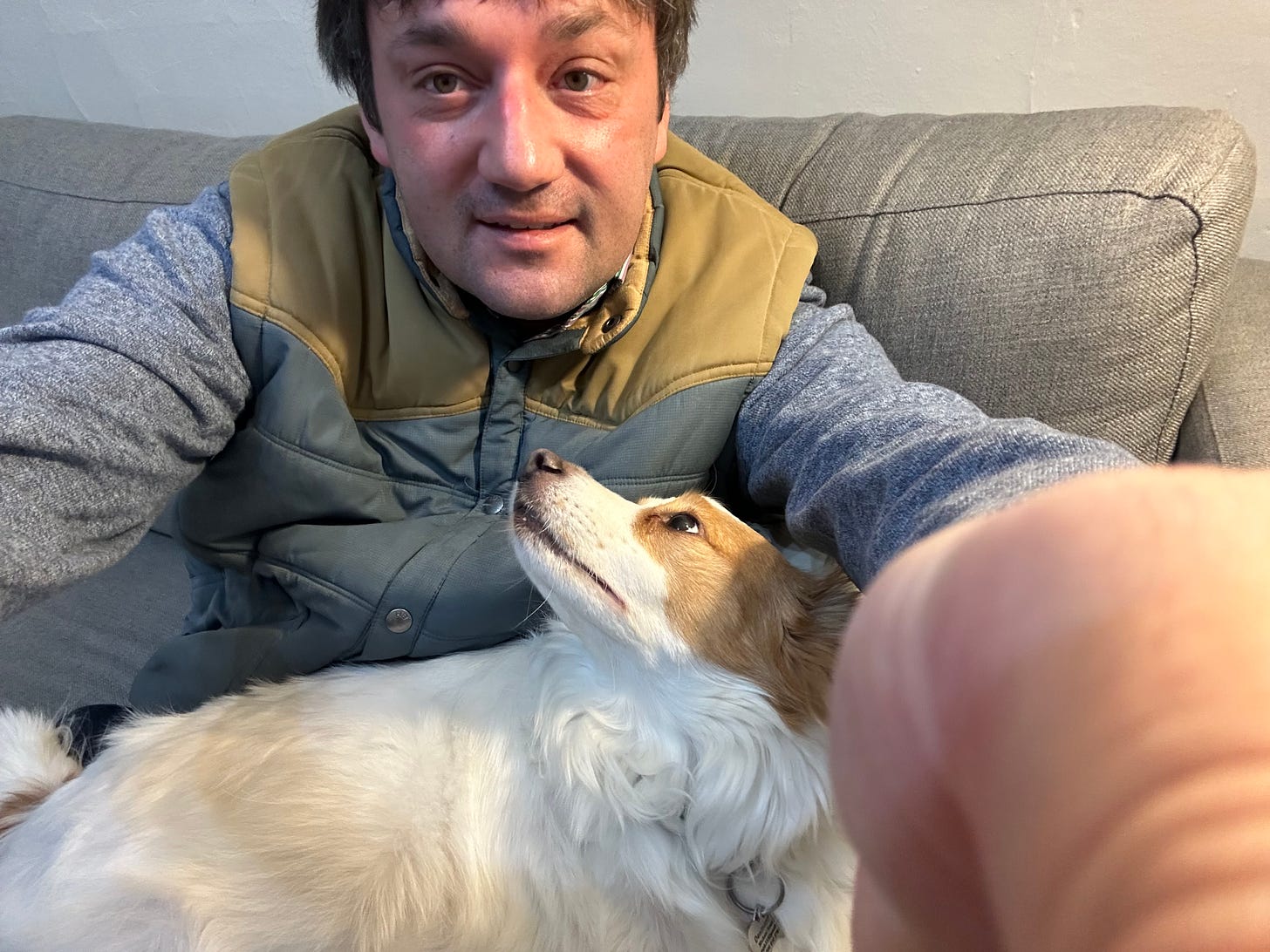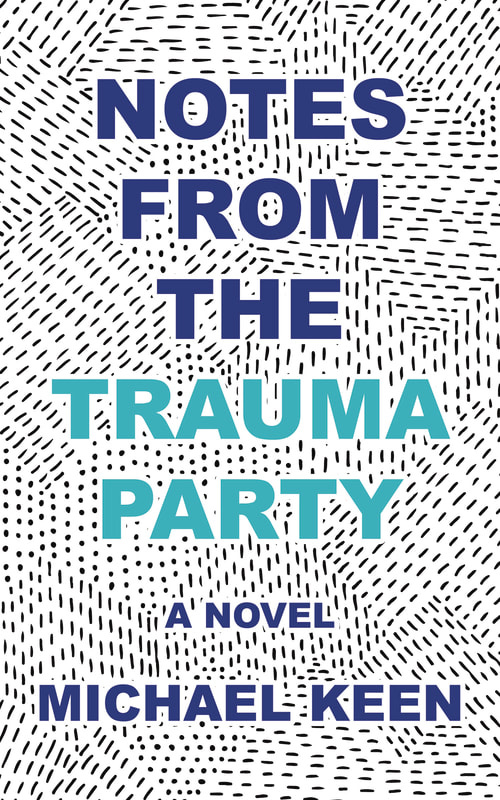Creative Conversations: an Interview With Michael Keen
November 29, 2023
Love this newsletter? Please consider becoming a paying subscriber. A year’s subscription is only $38. Your support helps me keep everything free and accessible and also grants you access to over three years of archives. It also helps me stay committed to this newsletter, and keep my lights on, so to speak.
Click the link below to subscribe or upgrade.
(also, I only need one more paying subscriber to have that elusive orange checkmark I said I didn’t care about)
Creative Conversations is an author interview series. This week, I interviewed Michael Keen, whose novel Notes From the Trauma Party was released last week.
I first met Michael when I was an undergraduate at Syracuse University, in 2013 (or was it 2014??). It was his first year studying fiction at Syracuse’s creative writing MFA. When I met him I immediately knew I’d met a kindred spirit. Michael’s not only a wonderful writer but also an incredible human—kind, philosophical, funny, and authentic. This voice comes through very clearly in his book, which is a fictionalized account of his addiction to cocaine and life as a social worker (but also so much more than that). He wrote Notes From the Trauma Party while working as a hospice social worker in Seattle, WA. Only a few weeks ago, he celebrated a year of sobriety. A huge accomplishment!
In Notes From the Trauma Party the first-person narrative voice is confessional, honest, and spectacularly propulsive. A serieis of notes compose the book’s structure, all of them transiting and orbiting moments and decades and and relationships and geographical spaces in a manner that feels almost magical. I never felt lost— a function of the high level of craft guiding the reader along. Any writer knows that’s a difficult feat to createa a well executed non-linear narrative. Here, it’s done well.
Michael categorizes the book as autofiction. The narrator’s name is also Michael. He’s a coke addict, a social worker, an MFA candidate, and a Puyallup, WA kid who’s retreated to a Buddhist monastery, amongst other things. Michael is a philosophical narrator, casually striking the reader with incisive insights and profound observations.
The book examines and questions prescribed ideas of traditional masculinity— how men are expected to behave in romantic, intimate relationships but also what’s asked of them in their relationships with other men. There’s a complete transparency here; the reader can see through the artifice of male performance because the narrator resists performing his gender as it’s been socially conditioned and as is expected by others.
Michael doesn’t shy away from any subjects in Notes From the Trauma Party.
The book is intense and unflinching. He recounts watching Traces of Death as a twelve year-old and paints a brutally clear picture of drug addiction, the intricacies of intimate relationships, alcoholism, death, childhood sexual assault, and his experiences as a social worker.
Depending on your background this book may need a trigger warning, but personally I didn’t feel overwhelmed while reading, maybe because the narrator feels so close, and my personal life experiences involve so much of what he’s going through. There is a ruthless honestly embedded in the narration, along with a surprisingly sweet sense of caring, generosity, and kindness— of wanting to be good and do good, but not necessarily knowing how. This is the addict’s eternal struggle, one that can only be addressed with sobriety.
The closeness of the narrative voice takes on the qualities of a guide through the underworld. The guide doesn’t always have his shit together, but he can’t help but be concerned for the well being of others, which makes him quite trustworthy.
This book has my highest praise. Notes From the Trauma Party was published by Tailwinds Press. Here’s what has to say about it:
"One of the strangest, most powerful books I've read in a long time. Notes from the Trauma Party is riveting; terrifying and hope-giving at once. What powers both reactions is Keen's masterful voice: laconic, so frank it hurts, wildly funny in places, always genuine. It's a book I won't forget-and I bet you won't either, once you've read it-that taught me something new about the struggle (a spiritual struggle and a national one) to gain freedom from trauma and addiction. It moved me very much." -George Saunders

Michael Keen Responds the the Creative Conversations Questionnaire:
Q: How did you come to writing?
I started writing in my mid-20s in order to cope with the stress of being a social worker. I’d always been a big reader, but hadn’t ever considered writing stuff of my own until I talked with a co-worker of mine who had had a near-death experience. When she told me about her experience, I asked her if the whole “my life flashed before my eyes” thing happened to her. She said that it hadn’t, but that what did happen is that she was flooded with regret. People she’d hurt. Chances she wishes she’d taken. I was mulling that over when she said to me, “What do you think you’d regret if you were in that position?” The first thing that popped into my head was that I’d regret not trying to be an artist of some kind. That was the day I decided to really commit to writing. Whereas before that day I’d mainly used writing as a kind of therapy/catharsis, after that conversation I decided to apply to MFA programs.
In terms of genre, I actually like poetry more than fiction. I’m surprised I turned to fiction, actually, given my preference for poetry. I think part of me was drawn to fiction because I didn’t have much aptitude for it. I was really bad at things like plot and character, so fiction posed more of a challenge to me than poetry.
Q: Where do you look when you need inspiration?
I go back to movies and books a fair amount, but I’ll go to those pieces of art for different reasons. I really like the book, Blood Meridian, for instance—and have read it multiple times—but I don’t go to it for solace or comfort or for emotional complexity. I go to it just to be reminded of how beautiful language can be. The quality of the writing is insanely high, and it’s wonderful to just be able to bear witness to something that beautiful. What’s interesting about that book is that the language is beautiful, but the stuff being described is like unspeakably brutal/awful. There’s an interesting tension there.
I return to certain poets a lot too. Specifically, John Berryman (in Dream Songs) and Franz Wright (in Walking to Martha’s Vineyard). While it’s not fiction, I also return to religious literature a lot. There’s a book by this French mystic (for lack of a better word; she lived a fascinating life) Simone Weil called Gravity and Grace that is absolutely beautiful and fascinating. I’ve never read anything like it. It’s kind of just a series of aphorisms about her relationship to God. Really astonishing stuff.
I also get a lot of inspiration from just listening to other people. I hear amazing stories as part of my job—from both patients and family members—and I find that to be inspiring.
(Side note from Anastasia: Blood Meridian is also one of my favorite books, and I often return to it when I need reminding of what holistically exceptional writing and storytelling can accomplish).
“I’m happy I’m publishing a book, but what I get the most joy from is just sitting down in front of my computer and seeing what’s going to come out any given day. It’s like a means by which I can explore different parts of myself. I often don’t know how I truly feel about something until I’ve found a way to express it through writing.”
Q: What are some features of your writing life?
I write basically every day, and my goal is to get 333 words per day. That probably seems like an insane number, but 333/day is 10,000 words per month, which is 60,000 every six months. By basically any metric, 60,000 words is a novel-length work. My goal is to finish a novel every six months. My writing time is in the morning, before work. It usually takes me about 45 minutes to meet my quota.
In terms of profession, I’m a hospice social worker.
Q: Tell me something you struggle with as a writer.
I really struggle with feeling like I’m a failure.
I didn’t publish a single thing for the first fourteen years of my writing life. I tried querying agents, submitting stories to journals, etc. Nothing worked. And I’ve produced a lot of writing, so I really internalized the idea that I’m just no good at writing. I’d gotten the occasional piece of positive feedback, but really I just felt like publishing something probably wasn’t going to be part of my journey as a writer.
I also struggle a lot with the feeling that my writing isn’t a true expression of who I am. Tone is very important to me, and I want the tone of my work to accurately represent how I view the world. Which is fundamentally a tragicomic view, one that embraces both absurdity and sincerity. I usually feel like my writing is either too absurdist or too sincere, and I really have found it difficult to correctly calibrate things so that my writing’s tone is to my liking.
(Side note from Anastasia: I feel like Michael nailed this in Notes From the Trauma Party. It’s tone is so consistent, and the voice is very clear).
Q: What does being a writer mean to you?
Writing is a process-oriented thing for me at this point. Publication isn’t my goal. I’m happy I’m publishing a book, but what I get the most joy from is just sitting down in front of my computer and seeing what’s going to come out any given day. It’s like a means by which I can explore different parts of myself. I often don’t know how I truly feel about something until I’ve found a way to express it through writing. It’s like I don’t know my thoughts until I’ve forced myself to express them.
Q: Tell me about your book. How long did it take to write and what was your process of creation? How long has this book been living inside you, and can you pinpoint its moment of germination?
95% of the book was written in a four-month stretch. It’s heavily, heavily influenced by actual events, so the process of discovery wasn’t as operative for this project. What I mean is that I didn’t have to imagine as much, because I was largely depicting stuff that had happened.
It feels like I entered a flow state during the final week or two of the project. I was probably averaging 2 or 3 thousand words a day for the final couple weeks. In terms of gestation, a lot of the anecdotes in the book have been in my head for decades. There’s a lot of childhood trauma mentioned in the book, and the weight of that stuff I’ve been carrying for many, many years. Writing about all that was a way of making things cohere into a narrative of who I am and where I’ve been. I’m grateful it came together how it did.
Q: How has publishing a book changed how you feel about yourself as a writer?
Publishing the book has been amazing, but not in the ways I expected. I haven’t gotten a bunch of attention or anything from the publishing world, but I got what I’d always wanted: recognition from my friends that I was doing something valuable.
I had a huge book release party—probably 70 people showed up, including my old college girlfriend, old co-workers, etc.—and there were a lot of people who were puzzled by my life decisions (a lot of people I did high school debate with wondered why I never became a lawyer) that I think started to understand my path when they witnessed the reading. It was very healing for me to have the people close to me bear witness to my artistic journey by going to the reading. Publishing the book also feels good because I have a physical artifact—I have over a hundred copies in my apartment right now—that’s a testament to me being a writer. There’s something about the physical object that’s comforting to me.
The final thing is that publishing something makes me want to write more. It makes me want to leave behind a body of work and to keep on writing.
Watch Michael read portions of his book at his recent release party, which was held in Seattle, WA.
Want to contact Michael? You can email him here.







I enjoyed this interview so much! There was a freshness, a directness, about Michael's answers that I found really beguiling. I'm also intrigued by his writing practice - 333 words a day! I think Graham Greene used to have a similar rhythm of work. Thank you, Anastasia!